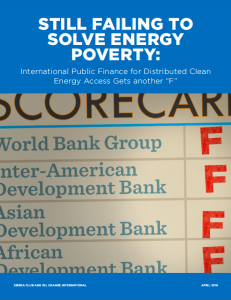 Still Failing to Solve Energy Poverty: International Public Finance for Distributed Clean Energy Access Gets another “F”
Still Failing to Solve Energy Poverty: International Public Finance for Distributed Clean Energy Access Gets another “F”
Oil Change International and Sierra Club
April 2016
This report provides a new look at the 2014 report by Oil Change International and the Sierra Club titled Failing to Solve Energy Poverty: How Much International Public Investment is Going to Distributed Clean Energy Access?
As noted in the 2014 report, energy poverty remains a major global issue, as approximately 1.1 billion people still lack access to electricity worldwide.
This report assesses how four multilateral development banks (MDBs) — World Bank Group, Inter- American Development Bank, African Development Bank, and Asian Development Bank — are measuring up in their efforts to address the global energy access challenge.
Key findings include:
- All of the banks again received a failing grade of “F” when evaluated against the five energy access criteria, as they did in the previous version of this report released in 2014. This is a disappointing outcome given the increased awareness of the importance of universal energy access spurred by, among other things, the Sustainable Energy for All initiative.
- For some institutions, energy access investment actually declined year on year.
- Absolute investments in energy access and distributed renewable energy increased slightly since the previous report was published. Across most criteria, performance remained relatively stagnant amongst the banks, with major declines in some areas and modest improvements in others.
- The African Development Bank was the only bank to increase its score relative to the previous version of the report. The reason for the increase was the announcement of the New Deal on Energy for Africa, which was counted as a program dedicated (in part) to distributed renewables. The African Development Bank’s scores in the other areas evaluated declined substantially.
- Out of the four banks examined, the Asian Development Bank and the African Development Bank had the highest proportion of their energy portfolios dedicated to access, but they still remain far below the benchmarks in this area.
- Within their energy access portfolios, out of the four banks examined, the Inter-American Development Bank and the World Bank Group devoted the highest proportion to distributed renewable energy, but they still remain far below the benchmarks in this area.
- No MDB has come close to aligning investment with the IEA Energy for All Case. Fossil fuel projects financed by the MDBs are not serving the poor.
- Fossil fuel projects financed by the MDBs are not serving the poor. As was found in the previous report, project documents show that fossil fuel based projects analyzed across the four MDB energy portfolios rarely addressed energy access for the poor in any meaningful way. Just five percent of fossil fuel funding was clearly linked to energy access objectives.
